Did you know that most blog content gets zero traffic from organic search?
According to Ahrefs, 96.55% of pages get no traffic from Google.
But here’s the good news—it doesn’t have to be that way. Over the past decade, I’ve worked with all kinds of blog content and successfully ranked pages across the web, from Quora and Reddit to blog posts on regular websites.
So, in today’s blog post, I’ll break down the most common blogging mistakes businesses make that prevent them from getting traffic and show you how to fix them.
Let’s get started.
More...
Targeting topics that have no search demand
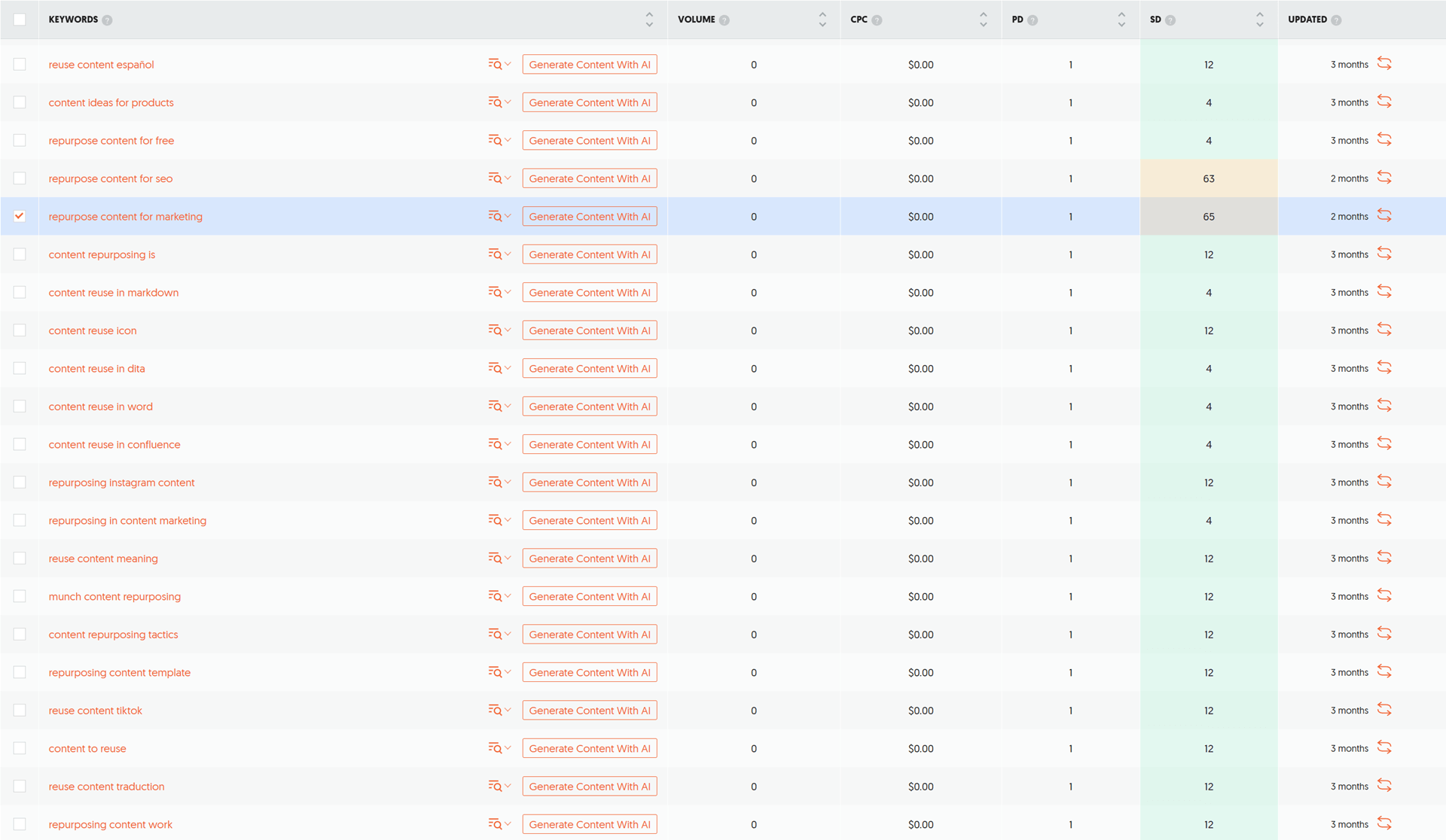
This is one of the most common mistakes businesses make. Businesses often target topics that get very little to no search traffic, which means they don't provide many long-term benefits.
Let me share a quick personal example. A while ago, I was doing keyword research to find potential topics for our blog and found a few topics that interested me, but when I checked their search volume…they didn't get any traffic.
Sure, these topics were fascinating from an industry perspective, but writing about them would’ve been like talking to an empty room. No matter how well-written the content would have been, it simply wouldn't have reached our target audience.
The fix?
Really simple! Do thorough research before you dive into creating content.
Just because you find a topic exciting or believe it's important, it doesn't mean people are actively searching for information about it. It’s key to find the sweet spot between:
Do this, and you’ll be set.
Targeting topics or keywords that are too competitive
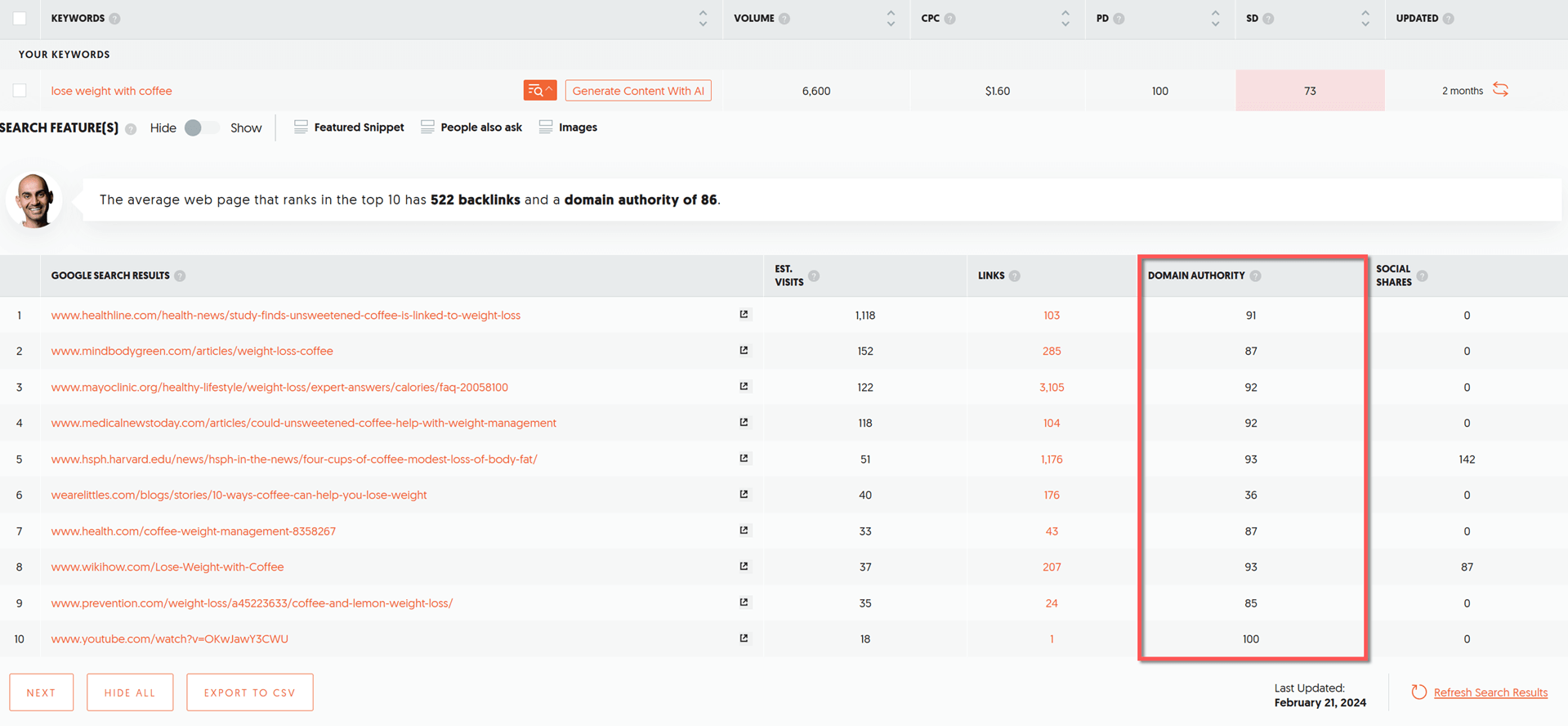
Another common pitfall for small businesses is going after keywords that are way too competitive. They often target broad, highly competitive terms, even though they don’t stand a chance against bigger, more established companies.
And the problem is pretty obvious. If your website is new or has low authority, there’s no way you’re competing with giant companies for high-competition keywords.
That’s just not how Google and other search engines work.
Here’s something you can try next time you do keyword research:
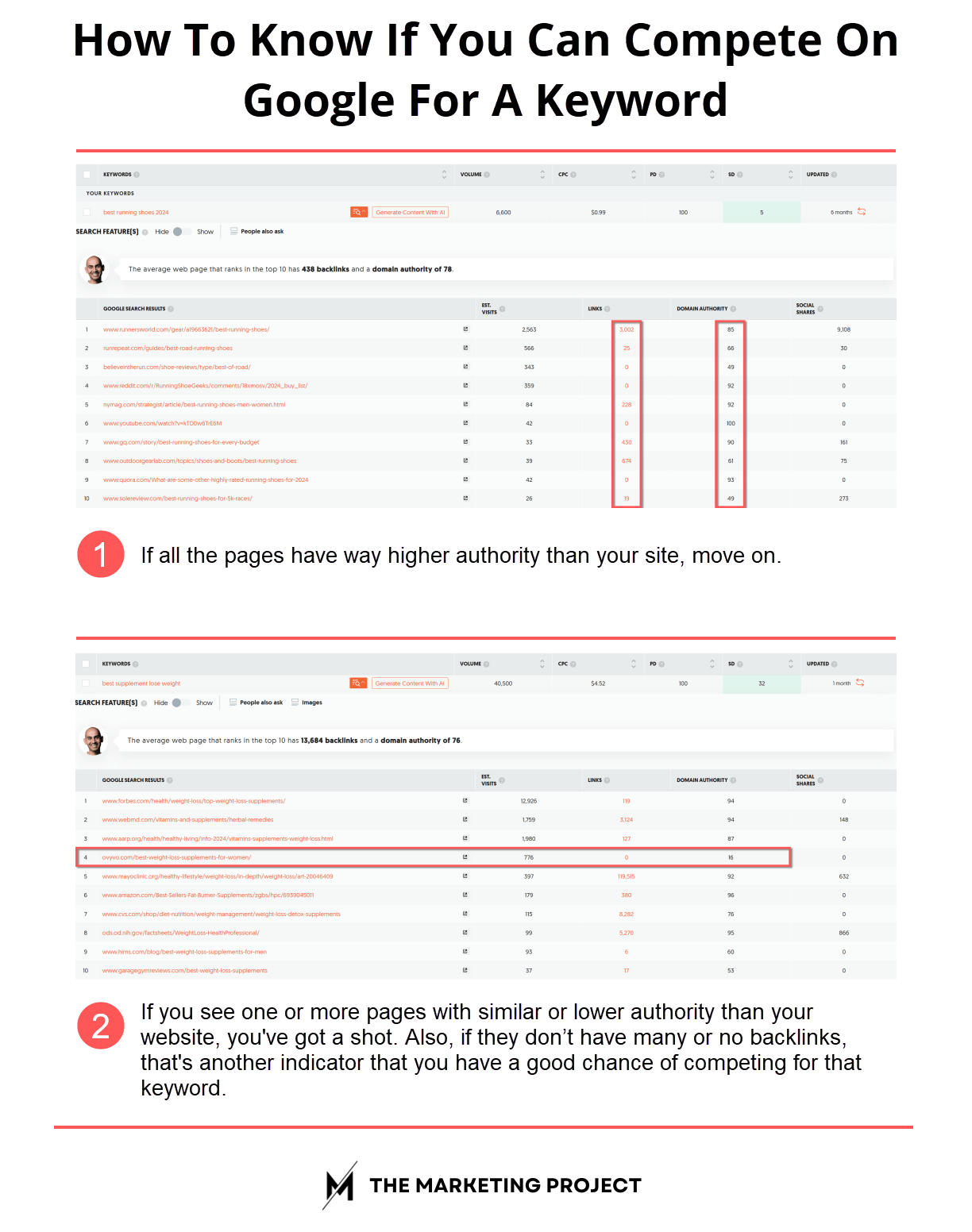
Check the authority of the top 10 results. If they’re all significantly higher than your site, move on.
But if you see one or more pages with similar or lower authority than your website, you’ve got a shot.
Also, check their backlinks. If they have a few or none, that’s another indicator that you have a good chance of competing for that keyword.
Let me give you an example, let’s say your website focuses on helping people lose weight through healthy eating and exercise.
You might think of targeting keywords like “lose weight with coffee,” “food plan to lose weight,” “lose weight cycling,” or “healthy snack to lose weight.”
In theory, all those topics would be good targets for your blog, but the problem is that when you take a look at the pages that are ranking, they either have a very high domain authority or they have too many links pointing to them.
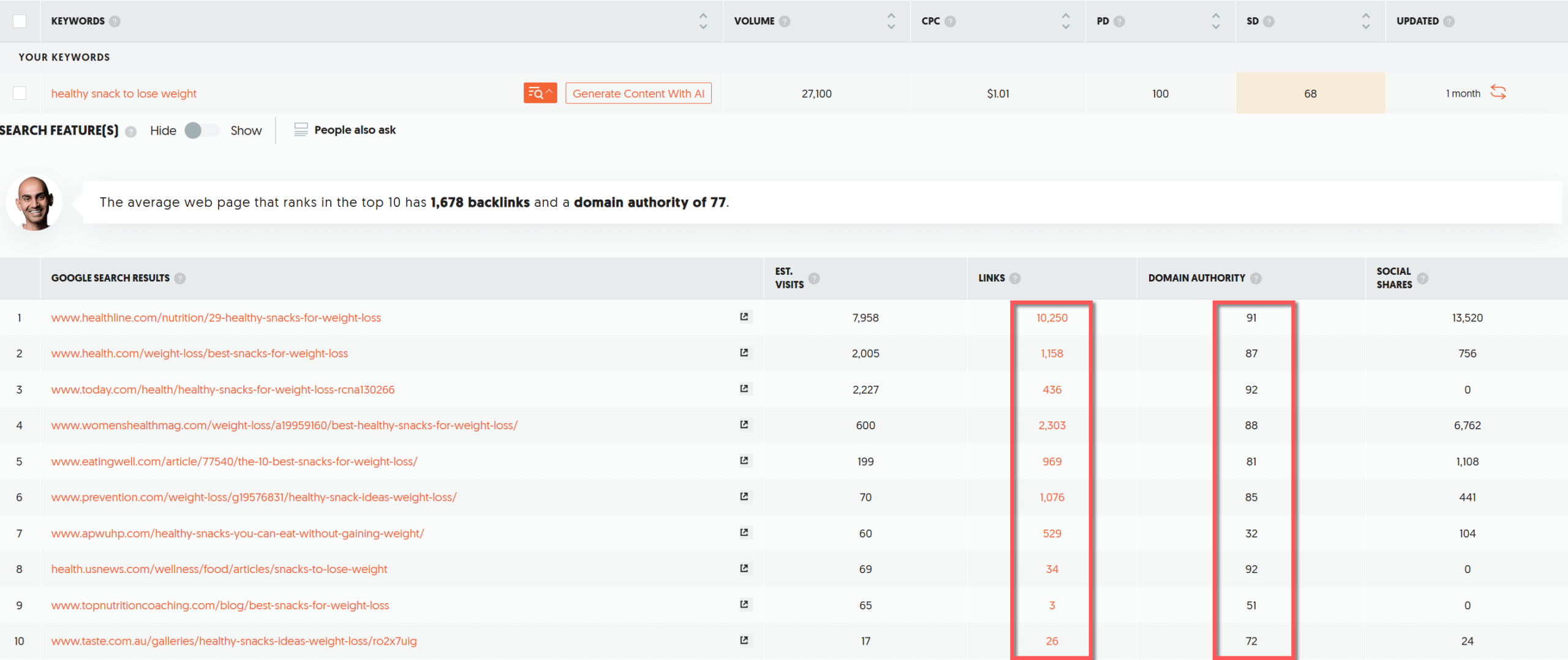
Which means it’s going to be really tough, if not impossible, to rank for those search terms—unless your website has a similar authority as the ones you see in the top ten. And even then, you’d probably need some link building to compete.
Note that this is a little bit of an oversimplification. There are other factors you need to consider when choosing blog topics, but this paints a good picture for what you need to do and consider.
Once you find a topic you believe you can realistically rank for, and it aligns with your business goals, move on to figuring out search intent.
Do you need help creating blog content?

If you're looking to create blog content that drives organic traffic to your business blog but don't have the time or resources to implement these strategies yourself, we can help.
We offer blog writing services backed by thorough keyword research and SEO best practices. Check our blog writing service page if you'd like us to take care of blog writing for you.
The page doesn’t match search intent
If you’re unfamiliar with the term “search intent,” it’s what someone is trying to achieve when they type something into Google.
There are 4 types of search intent:
Understanding search intent helps you create content that actually gives people what they're looking for, instead of just “throwing spaghetti at the wall” and hoping something sticks.
As a business or content creator, it’s your job to determine search intent before creating anything to ensure you craft the type of content people want to see.
In the past, figuring out search intent was a manual task. But now, Ahrefs has introduced a new feature into their platform that shows you this data at a glance - making the process much easier.
If you’re doing keyword research, I highly recommend using Ahrefs. It used to be expensive but now they have a Starter plan you can use. It’s great for small businesses.
Your page has no backlinks
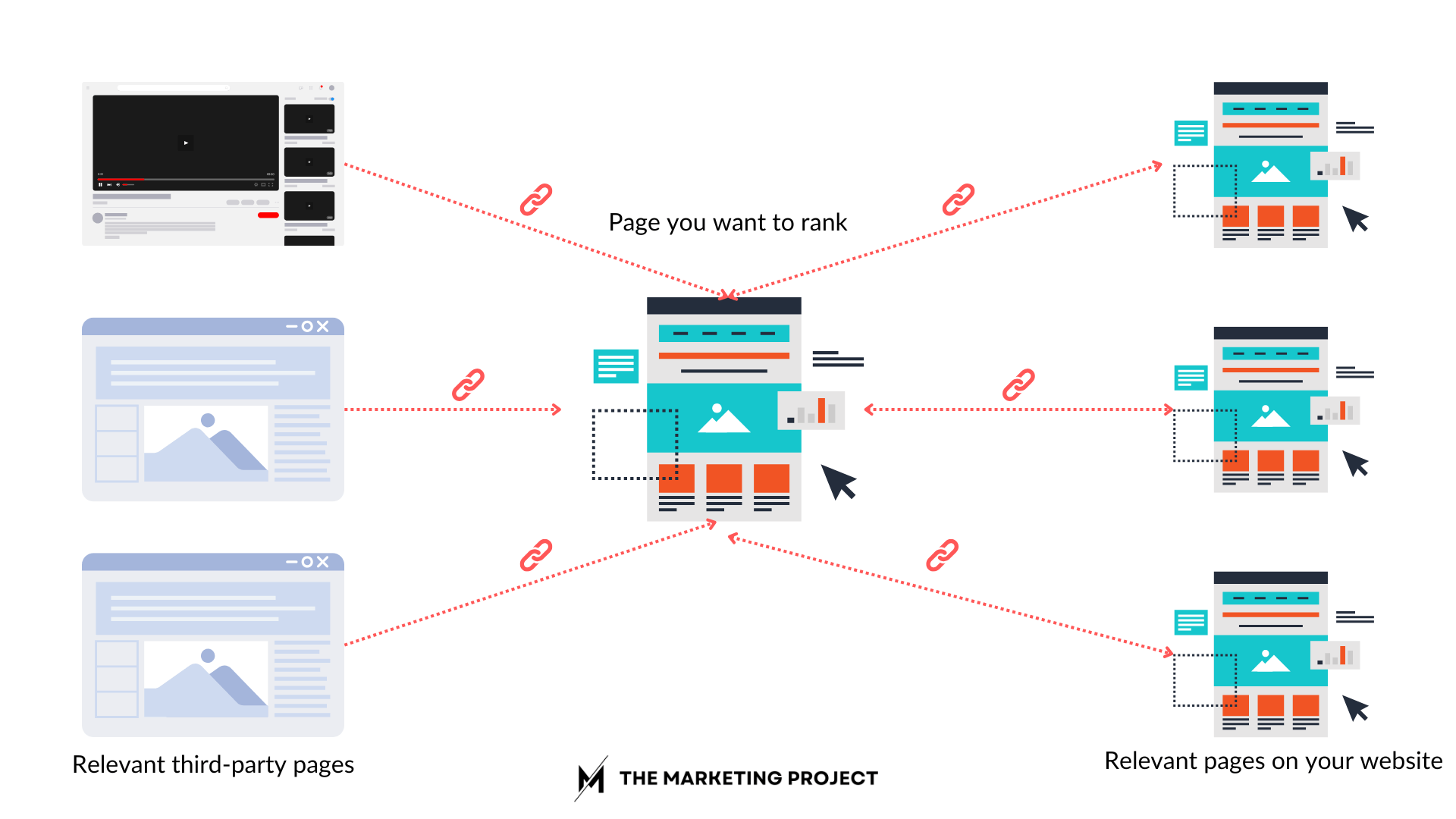
Sometimes, you’ve done everything right—you’ve picked the right topic, matched search intent, but you’re still not ranking. What’s going on?
To be honest, this is something we would have to take a closer look at to have a better idea of what you need, but it’s very possible that what you need to do is to build backlinks.
For example, let’s say you’ve chosen a topic you can realistically compete for, and you met search intent but your competition already has backlinks.

Then, it’s all a matter of promoting your content to build backlinks on relevant pages. You can even build internal links if you already have content with high relevance and external backlinks pointing to them.
I won’t go into a full tutorial on building backlinks here, that’s beyond the scope of this post. But Ahrefs has fantastic resources and tutorials that guide you through the process. I recommend checking them out.
My closing thoughts
There are many ways to write and optimize blog content for search, but if you follow the steps I shared with you today, you'll be in a much better position, and I guarantee you'll see better results.
The key is to be strategic with your content. Focus on what your audience actually wants to read, and make sure you can realistically compete in search. Do that, and I’m sure you’ll be fine.
Do you need help creating blog content?

If all of this feels like a bit much and you need some help with your blog writing, visit The Marketing Project.
We offer complete blog writing services backed by solid keyword research and SEO best practices. Check out our blogging service page if you'd like us to take care of blog writing for you.
